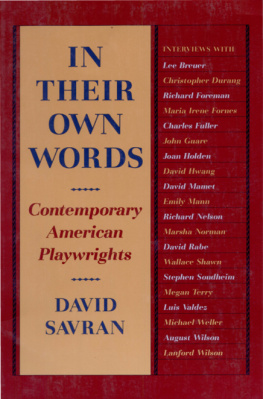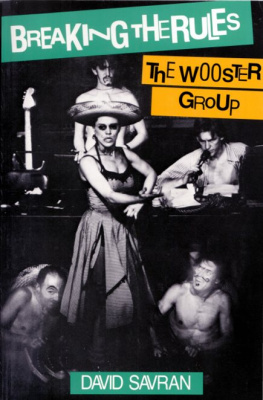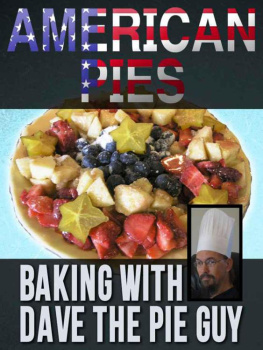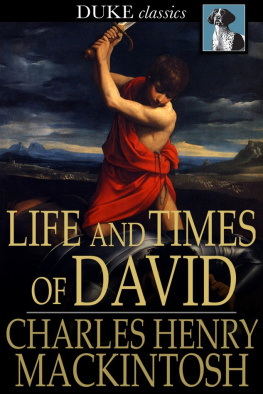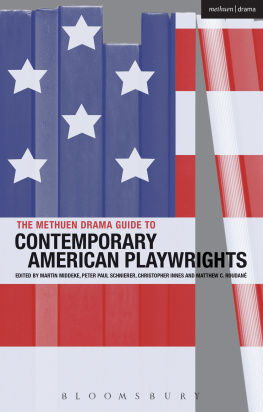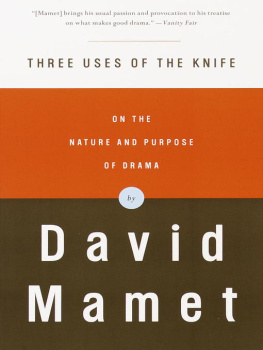IN
THEIR
OWN
WORDS
IN
THEIR
OWN
WORDS
Contemporary American
PLAYWRIGHTS
DAVID SAVRAN
THEATRE
COMMUNICATIONS
GROUP
Copyright 1988 by David Savran
In Their Own Words: Contemporary American Playwrights is published by Theatre Communications Group, Inc., the national organization for the nonprofit professional theatre, 355 Lexington Ave., New York, NY 10017.
The publications and programs of Theatre Communications Group, the national organization for the nonprofit professional theatre, are supported by Actors Equity Foundation, Alcoa Foundation, Atlantic Richfield Foundation, AT&T Foundation, Citicorp/Citibank, Columbia Pictures Industries, Consolidated Edison Company of New York, Eleanor Naylor Dana Charitable Trust, Dayton Hudson Foundation, Exxon Corporation, The William and Mary Greve Foundation, Home Box Office, Inc., The Andrew W. Mellon Foundation, Mobil Foundation, Inc., National Broadcasting Company, National Endowment for the Arts, New York Life Foundation, New York State Council on the Arts, The Pew Charitable Trusts, Philip Morris Incorporated, The Rockefeller Foundation, The Scherman Foundation, Shell Oil Company Foundation, the Shubert Foundation, Inc., Consulate General of Spain and The Xerox Foundation
All rights reserved. No part of this book may be reproduced in any manner whatsoever without written permission from the publisher, except in the case of brief quotations embodied in critical articles and reviews.
Condensed versions of interviews with Richard Foreman, David Mamet and Luis Valdez appeared in American Theatre magazine.
Library of Congress Cataloging-in-Publication Data
Savran, David, 1950
In their own words.
1. Dramatists, American20th centuryInterviews.
2. American drama20th centuryHistory and criticism.
3. Playwriting. I. Title.
PS352.S28 1988 812.5409 88-2118
ISBN 978-1-5593-6710-3
Design by The Sarabande Press
Second Printing: July 1989
Third Printing: July 1992
Fourth Printing: February 2001
To Paula
ACKNOWLEDGMENTS
F irst and foremost, I want to thank the playwrights interviewed for their insights, generosity and candor.
My thanks to Martin Bergbusch, Associate Dean of Fine Arts, and my colleagues in the Drama Department at the University of Regina for indulging my frequent absence from campus during the past year. My special appreciation to William Dixon for taking over as Acting Department Head during the summers of 1986 and 87. My thanks to Bonnie Jackson and Jeanette Groenendyk, to the University Presidents Fund and to my students in Twentieth-Century Drama, winter semester 1987, for their encouragement and support.
I want to express my gratitude to the many people who, in the past year, helped me clarify my ideas, prepare for the interviews and plan the introductions. Special mention must be made of Stacie Chaiken, Joan Duncan, Beth Eisenberg, Wesley Gibson, John Hirsch, David Hult, David Hutchings, James Leverett, Gwen Parker and Laura Ross. Finally, I want to thank the three people who have been most deeply involved in this project: M. Elizabeth Osborn, my wise and compassionate editor at TCG; Paula Vogel, who instigated the project and advised me every step of the way; and Ronn Smith, who provided sharp insights and support when and where they were most urgently needed.
The photographs in this book are reproduced by the kind permission of the following photographers: p. 3, Ilaria Freccia; p. 51, Ricardo Block; p. 84, Robert Mapplethorpe; p. 100, Jeffrey Davenport; p. 117, Ophelia Y.M. Hwang; p. 132, Brigitte Lacombe; p. 145, Dennis Behl; p. 178, Langdon Clay; p. 193, Ed Betts; p. 207, Bobbi Hazeltine; p. 223, Gerry Goodstein; p. 240, Cynthia MacAdams; p. 257, Marek A. Majewski; p. 272, Susan Cook; p. 288, William B. Carter; p. 306, Diane Gorodnitzki. All uncredited photographs courtesy of the individual playwrights.
CONTENTS
Imagine that you enter a parlor. You come late. When you arrive, others have long preceded you, and they are engaged in a heated discussion, a discussion too heated for them to pause and tell you exactly what it is about. In fact, the discussion had already begun long before any of them got there, so that no one present is qualified to retrace for you all the steps that had gone before. You listen for a while, until you decide that you have caught the tenor of the argument; then you put in your oar. Someone answers; you answer him; another comes to your defense; another aligns himself against you, to either the embarrassment or gratification of your opponent, depending upon the quality of your allys assistance. However, the discussion is interminable. The hour grows late, you must depart. And you do depart, with the discussion still vigorously in progress.
Kenneth Burke
O n a cold afternoon in February 1986 I sat with my friend Paula Vogel, playwright and teacher, in a Blarney Stone tavern in the heart of the Broadway theatre district. Together we surveyed the American theatre in dismay. Although wed read and seen some brilliant and powerful new work, we wondered why so many fine plays either remained unperformed or received inadequate productions and failed to find an audience. Why has it been so difficult, we asked, to get challenging new work produced? Why has the American theatre become so tame? Why has it cut itself off from its social context? Why has it so neglected drama that attempts serious historical analysis? Why has money been the only thing at stake in so many productions of new plays?
I recalled when we were in graduate school and we believedmaybe somewhat naivelythe theatre to be a vehicle for social change, a locus for political and cultural dialogue. I thought about the following years, after Paula moved to New York to write and I started teaching in Canada, about the thrill of discovering new work at the Public Theater or La Mama, the exhilaration of seeing Stephen Sondheims Sweeney Todd or Caryl Churchills Cloud 9 or John Guares Gardenia. Ten years and three beers later, the situation looked completely different.
Trying to account for the crisis in the American theatre from New York s narrow perspective, we noted many causes, including the severe economic constraints that set the priorities of many producers, the myopia of the most powerful critics and the success of a reactionary regime in debasing the level of political dialogue, both on and off the stage. We wondered how the situation differed in other parts of the country. When Paula asked me how the American playwrights we most respected felt about this crisis, I told her I knew only what I could deduce from their plays because there was no book detailing their views. Paula then suggested I edit such a collection, soliciting essays from playwrights about their craft and sense of social responsibility.
I was then too busy revising my Wooster Group book for publication to begin work on another project. During my annual summer sojourn in New York, however, I reconsidered Paulas proposal, recognizing that a book of essays couldand shouldprovide an effective tool with which to diagnose the theatres malaise. I approached Theatre Communications Group with the idea and quickly realized that it was impractical to solicit essays from playwrights. We agreed instead on interviews, to be accompanied by short critical introductions. TCG gave me a go-ahead in August and I drew up a list of questions that, I believed, would expose the nature of the crisis in the American theatre and the position of each of the leading writers vis-a-vis this crisis. Together with TCG, I selected the playwrights.

